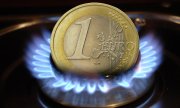What can be done about high energy prices?
The recent surge in energy prices in Europe has many causes: emissions trading, the nuclear phase-out, the conflict with Russia and the resulting rise in the price of Russiangas. Consumers are increasingly feeling the pinch. The EU Commission now wants to facilitate joint purchases of natural gas. Europe's press discusses what else needs to be done.
Median income far too low
The Estonian government has announced plans to provide support to households whose income is below the median salary of 1,052 euros per month- which applies to 46 percent of the population - to help them cover their energy bills. Õhtuleht is appalled:
“The truth is that people don't want to fill out applications for assistance, they want to get by on their own wages. The median salary should be at a level that at least covers basic needs and allows people to put aside enough savings to ensure that a few months of higher electricity bills don't mean they have to ask for help. Why are median earners reduced to paupers rather than being citizens who can get by on what they earn? What is the government's plan so that in future half Estonia doesn't have to ask for help to cover their electricity bills?”
Riga must set the right priorities
The Latvian government is focusing solely on the pandemic, criticises Neatkarīgā:
“Now other measures are needed: deferred payments, subsidies. This time, not only the poorest need support, but also other sections of society. Electricity consumption increases in the winter: there are more children's clothes to be washed, the kettle is boiled more often, the electric heating goes on when temperatures dip to below minus 15 degrees outside. Unfortunately, the Krišjānis Kariņš government is focused on entirely different problems: vaccination rates and dividing seniors into the good and the bad. The vaccinated get 20 euros a month, the unvaccinated get nothing. In the meantime, those 20 euros have become worthless - because they're not enough to help a pensioner survive the winter.”
Be more careful with political statements
Germany's new foreign minister is also to blame for the latest increase in gas prices, strana.best complains:
“On December 12, Annalena Baerbock declared that Nord Stream 2 violated EU energy law and could therefore not be put into operation. ... The market reacted immediately with a surge in the gas price. It went from 1,260 US dollars per thousand cubic metres before the announcement to 1,400 afterwards. A few more such declarations and the price will hit a high of 2,000 dollars once again. So with her scaremongering, the minister is in fact doing Gazprom a favour.”
No European autonomy without nuclear power
Sweden's Foreign Minister Ann Linde said before Monday's meeting of EU foreign ministers that her colleagues need to do their homework on energy because energy and foreign policy are intertwined. Liberal politician Jan Björklund voices his relief in Expressen:
“Better late than never is what we can say about this insight. Others have known this for a long time. That is precisely why we warned against Germany's irresponsible nuclear power management, which inevitably leads to this unhealthy dependence [on Russian gas]. ... But the [Swedish] Red-Green government considered the German energy transition to be exemplary. It refused to see the connection between nuclear power and continued foreign policy autonomy in Europe.”
Don't bicker over emissions trading!
Poland plans to push for a reform of the European emissions trading scheme at today’s summit meeting of the European Council. For Rzeczpospolita, this sets the wrong priorities:
“If the prime minister convinces his European partners to make substantial changes to the emissions trading system, Poland could miss an opportunity to use the rest of its political capital for more important changes to EU energy policy. ... Instead of fighting the Emissions Trading System, Poland should use the rise in energy prices to push for other demands such as greater EU independence from Russian gas supplies, or an increase in EU funding to support those who will bear the brunt of the costs of the energy transition.”

